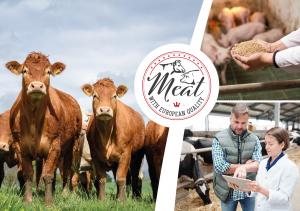Less and less use of antibiotics in the EU. What does this mean for consumers?
The EU has long been a leader in reducing the use of antibiotics in animal production, which has a positive impact on both human condition and the environment.
WARSAW, MAZOWIECKIE, POLAND, March 9, 2021 /EINPresswire.com/ -- Just like global warming, antibiotic resistance is a topic that is increasingly being addressed on the international arena, and reducing the use of antibiotics in meat production should be one of the basic objectives of modern and ethical livestock production. This is reflected in the objectives of the European Green Deal, under which representatives of European countries committed to reduce the use of antibiotics in animal production by 50% till 2030. Unfortunately, the European Union is one of only few bodies to introduce such restrictions, despite the fact that as many as 61% of American consumers are willing to pay more for meat produced without the use of antibiotics.
The European Union has long been a leader in reducing the use of antibiotics in animal production, which has a positive impact on both human condition and the environment. Fewer antibiotics mean less pressure on growing antibiotic resistance and a safer environment. European Union states have been successfully reducing the number of antibiotics used for over a decade. This phenomenon is based on three pillars: a ban on the use of antibiotics to stimulate animal growth, effective veterinary control and high standards of animal welfare and farm management.
Prohibition of the use of antibiotics for growth promotion and preventive purposes
The European Union is one of the first to ban the use of antibiotics in feed to stimulate livestock gain, even though it is common practice in many other countries. Such additives were discontinued pursuant to European Commission Regulation 1831/2003.
The next step towards limiting antibiotics in feed is Regulation 2019/6 and 2019/4 of the European Parliament and of the European Council, limiting prophylactic use of antibiotics as feed additives. The new regulations also update the restrictions on the use of antibiotics in animal feed and introduce an obligation to properly report information on antibiotics used in individual member states. The new law comes into force on 28 January 2022.
Effective veterinary control
Effective veterinary control and honest cooperation between farmers and veterinarians are important factors in reducing excessive use of antibiotics. This is particularly evident in the Netherlands and Denmark, where the use of these substances for treatment and prevention of animal diseases has been severely restricted to a specialised and authorised group of people. A good relationship between the farmer and the veterinarian ensures that the best possible production decisions are made, while veterinary control guarantees the proper use of medicines.
High level of animal welfare and professional management
Happy animals are disease-resistant animals. High animal welfare standards and efficient herd management translate into lower antibiotic use. Due to large space provided to livestock and high infrastructure requirements for production, antibiotic consumption is lower. High level of knowledge and competence of European livestock farmers also translates into better disease prevention and control.
The combination of these factors has resulted in an antibiotic use reduction in the EU, a process that has been going on for more than a decade. Antibiotic use for veterinary purposes in the European Union decreased by more than 32% between 2011 and 2017. The new regulations will ensure that this trend continues. The issue of the use of antibiotics in meat production is also becoming increasingly important on the other side of the Atlantic. According to some studies, as many as 72% of Americans take this aspect into account when shopping, and as many as 37% of shoppers are willing to pay up to a dollar more for a pound of meat produced without the use of antibiotics. The answer to these needs is the European Green Deal, which offers a number of solutions that benefit the environment and consumers' lifestyles.
Information about the campaign and current activities is available on www.meatfromeurope.eu, on YouTube and through social media channels - LinkedIn and Facebook. E-mail contact: media@meatfromeurope.eu.
ABOUT UPEMI:
Union of Producers and Employers of Meat Industry (UPEMI) is a modern and dynamic organisation which integrates the community of pork and beef producers in Europe. The mission of UPEMI is to promote European meat on foreign markets and to provide reliable and comprehensive information on meat quality, high standards and production systems in place in the European Union. UPEMI brings together companies from all stages of production, which share the values of fair animal breeding and production of high-quality pork and beef.
Meat with European Quality
UPEMI
+48 22 858 74 58
media@meatfromeurope.eu
Legal Disclaimer:
EIN Presswire provides this news content "as is" without warranty of any kind. We do not accept any responsibility or liability for the accuracy, content, images, videos, licenses, completeness, legality, or reliability of the information contained in this article. If you have any complaints or copyright issues related to this article, kindly contact the author above.

